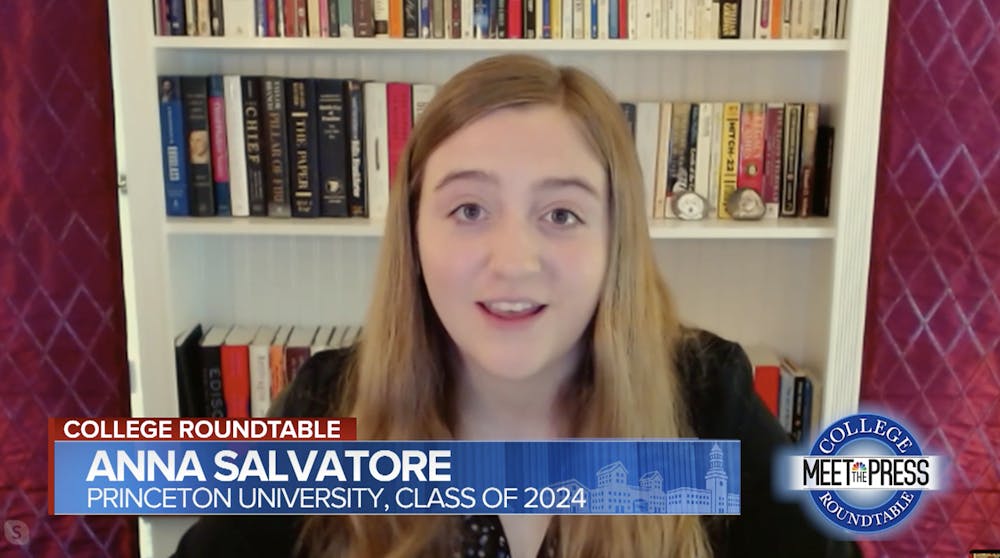Eight years ago, Anna Salvatore ’24, age 10, was reporting live from the scene of her family vacation, interviewing family members and crafting headlines like “Uncle Glenn went whitewater rafting” and “Mom lip synced in the kitchen.” On June 5, she appeared on NBC’s “Meet the Press: College Roundtable,” a weekly feature Chuck Todd’s flagship broadcast is running this month.
“It was really cool,” said the incoming first-year and student journalist about her experience on the show. “It was really cool to be in a Zoom and hear the disembodied voice of Chuck Todd. I’ve been watching Meet the Press for years now.”
According to Chuck Todd, the initiative to create the weekly “College Roundtable” edition of his show stemmed from the understanding that students’ “experiences are different than ours right now and we wanted to create a platform where they could ask questions directly to the decision makers they want answers from.”
“Students of all ages really had the end of the school year pulled out from under them in a way,” Todd wrote to The Daily Princetonian. “Especially higher education students … And what the fall looks like is even more uncertain for education. In every brainstorm and editorial discussion we would have, we kept coming back to the idea of education and students — what they’re thinking, worried about, unsure of, and so on.”
On the show, Salvatore, one of three college-aged journalists present for the panel, had the chance to ask NAACP President Derrick Johnson a question.
“President Johnson, throughout the interview you've been talking about combating systemic racism, such as reforming the criminal justice system and having a federal policy for open public records,” Salvatore said on the show. “But for your reforms to take place a lot depends on who holds national offices and who holds the White House. So how will the NAACP regroup if President Trump is indeed reelected? How will we go forward?”
Johnson replied, “The real question is how can this nation regroup if President Trump is reelected? NAACP, we're nonpartisan. We don't support political candidates, or parties. However, the realization that in the last 85, 90 days we've seen some of the worst displays coming out of this administration that we've seen, perhaps since the Civil War.”

Beyond the jitters and the honor of an opportunity to speak with Johnson, for Salvatore, the experience on “Meet the Press” was a chance to learn more about the craft of journalism from the best of the best. Before the show, Chuck Todd met with the three students to offer advice.
“I learned a lot from the conversation, however brief it was,” Salvatore said. “[One piece of] advice he gave us was [to] assume that the guest — whichever guest it’s going to be — is not going to answer the question as you hoped he or she would, and that it would take a follow up to get at what they really think or what they really mean.”
When asked whether he sees it as his role to help foster the next generation of journalists, Todd wrote, “I think it is every journalists’ responsibility, really.”

“I also think this next generation of journalists may be getting into the business for different reasons than maybe journalists before them — because their story and their life experiences haven’t been covered well or if at all, really,” he added. “That results in a more diverse set of experiences and backgrounds influencing newsrooms, something journalism needs. Especially now.”
For Salvatore, what first drove her “into the business” was a love for reading. “My love of journalism definitely stemmed from being a bookworm since I was a preschooler,” she said.
She has been the editor of her high school newspaper for the past couple of years at Hopewell Valley Central High School — about 15 minutes from Princeton, N.J. She is also the founder and primary writer of the “High School SCOTUS” blog, which boasts over 5,000 followers on Twitter and features “teenagers writing about the Supreme Court.”
“My favorite thing about being a reporter is having the excuse to talk to anybody,” she said. “As a normal person if you want to interview a public figure or even approach someone on the street, you might feel awkward. But if you have a reporter’s badge or even a pad in your hand, for some reason you have a power to interrogate them about their lives. It’s really cool and I love that.”
As a first-year, Salvatore hopes to get involved with student journalism on campus — “as soon as possible.” In Todd’s view, college newspapers are more important now than ever.
“With more local news outlets facing funding issues or having to cut back their coverage, college papers are becoming more of an important source of accountability for cities and towns across the country,” he wrote. “There’s a real need for local journalism and college students who are aspiring professional journalists can really fill a serious need.”








